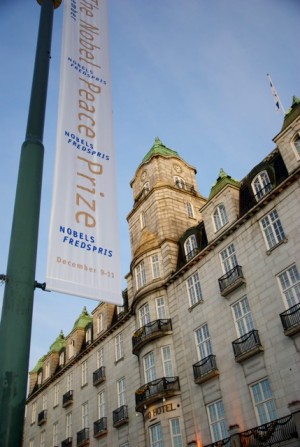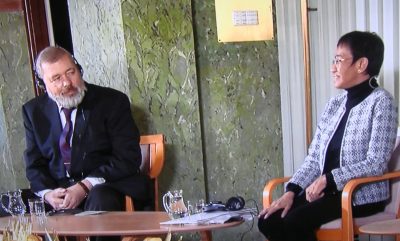This week’s annual celebrations of the Nobel Peace Prize in Oslo have been marred by disturbing events abroad involving former prize winners, and lots of Corona-related disappointments in Norway. On Friday came news that not even Crown Princess Mette-Marit could attend the prize ceremony Friday afternoon, for fear she’s been infected by the Corona virus.

Last year’s Peace Prize traditions had to be postponed because of the ongoing Corona crisis. That’s why the head of the World Food Programme, which won last year’s prize, is now in Oslo along with this year’s winners, journalists Dmitry Muratov of Russia and Maria Ressa of the Philippines. The World Food Programme’s executive director, David Beasley, needed to traditionally sign the Peace Prize protocol at the Norwegian Nobel Institute and deliver the Nobel Lecture that he couldn’t during last year’s brief digital ceremony at his offices in Rome.
Hopes were high that this year’s Peace Prize ceremony and traditions could resume as normal. The new Omicron strain of the Corona virus and sharply rising infection levels in Norway, especially Oslo, changed all that. Events have been pared down, face masks are back, the traditional banquet at the Grand Hotel had to be cancelled and few will be allowed to attend the Nobel Concert on Saturday.
The Nobel week also got off to a rough start when former Peace Prize winner Aung San Suu Kyi was convicted and sentenced to jail in her native Myanmar. The country has fallen back into the hands of military dictators accused by Oslo newspaper Aftenposten this week of trying to muzzle their Nobel Laureate forever. The irony was compounded by how this year’s winners are simultaneously being lauded for their brave efforts to preserve freedom of expression and the press.
Committee condemnations
The Norwegian Nobel Committee condemned the military coup in Myanmar earlier this year and the arrest of Aung San Suu Kyi, who won the Peace Prize in 1991 “for her brave campaign for democracy in Myanmar,” according to the committee, but couldn’t collect it until 2012, when she’d finally been released from house arrest and military generals eased their grip on the country. The committee called the generals’ latest coup “a serious setback in the fight for democracy and human rights in Myanmar.”
Meanwhile, the Peace Prize winner in 2019, Ethiopian Prime Minister Abiy Ahmed Ali, is waging war in his own homeland just two years later. Abiy had won the prize for his efforts to secure peace with Eritrea, only to resort to civil war in Ethiopia’s Tigray region. The Nobel Committee has expressed “deep concern” over the escalation of violence and called on all involved parties to “resolve disagreements and conflicts by peaceful means.”

Norway’s Nobel Committee could at least breath a sigh of relief this week when both of this year’s winners were able to travel to Oslo despite some ongoing Corona restrictions and all the threats and challenges they face in their own countries. Maria Ressa, for example, told reporters on Thursday that she had to get permission to travel from four different courts in the Philippines, where she faces what are widely viewed as trumped-up charges over her Rappler news service’s critical reporting of the Philippines’ authoritarian president, Rodrigo Duterte and his brutal war on drugs. Several thousand people have been killed in the government’s campaign to halt illegal drugs, and Duterte has himself threatened to kill Ressa.
Dmitry Muratov, who’s also being lauded with Ressa for their “brave campaign for freedom of expression,” also landed in Oslo earlier this week. He runs the independent Russian newspaper Novaja Gazeta that’s also critical of the Russian government and under constant threat. Six of its journalists have been murdered. Both Muratov and Ressa are viewed as champions of facts and truthful reporting against enormous odds.
Both expressed hopes that winning the Nobel Peace Prize will help shield them and other journalists from the greatest dangers they face in their work, while drawing public attention to the danger itself. “I hope it means better days ahead,” Ressa said at a press conference Thursday.
They were both having a busy morning on Friday including an audience with King Harald V. The royal family normally attends the Nobel Peace Prize ceremony and the banquet later in the evening. Corona has forced cancellation of the banquet, which will be substituted with a smaller dinner party instead. And on Friday morning, the Royal Palace announced that Crown Princess Mette-Marit wouldn’t be able to attend the prize ceremony either. She was ill with cold-like symptoms and needed to take a PCR test to determine whether she’s been infected with the Corona virus.
newsinenglish.no/Nina Berglund

